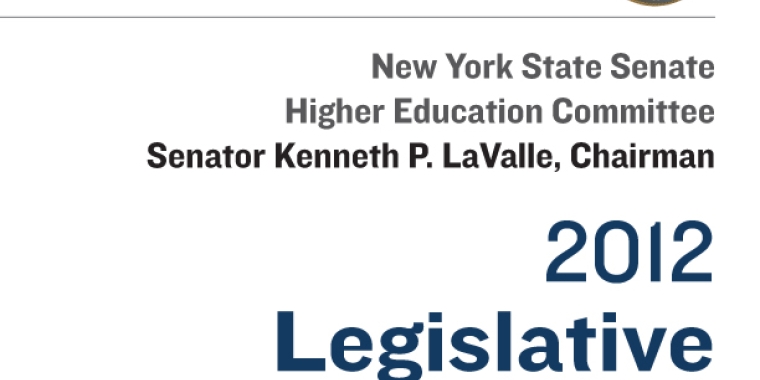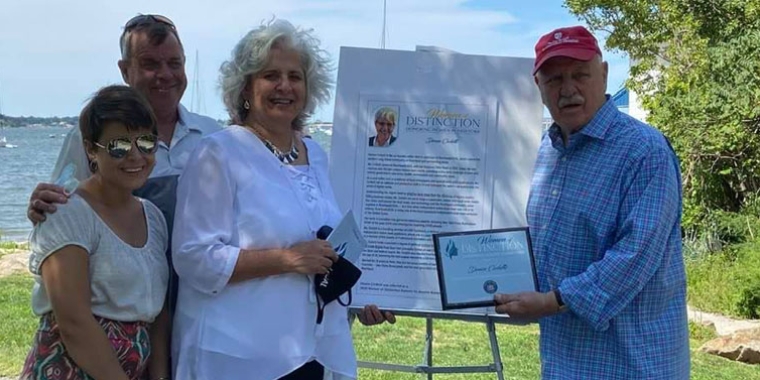2012 Higher Education Legislative Report
Kenneth P. LaValle
January 27, 2013
-
ISSUE:
- Higher Education
-
COMMITTEE:
- Higher Education

Dear Senator Skelos:
It is my pleasure to submit the annual report of the Senate Standing Committee on Higher Education for the 2012 legislative session. Although New York State’s institutions of higher education face many challenges, they continue to maintain high quality academic standards and continue to remain the state’s most valuable economic development engines.
After years of deep budget cuts, the 2012 enacted budget maintained funding for SUNY and CUNY at last year’s levels. This was achieved because of the historic SUNY 2020 legislation passed during the 2011 legislative session. The committee fought hard during those negotiations to include a maintenance of effort provision to ensure that while tuition increases authorized by that law were implemented, state funding would not decrease. Not only were funding levels maintained in 2012, but funds were increased for SUNY and CUNY community college base aid and for SUNY hospitals. Additionally, a new round of SUNY 2020 grants were authorized to be awarded to non-university center colleges.
In addition to providing much needed increases in funding to the community colleges, the committee recognized the need to look at the community college funding structure as a whole. The 2012 enacted budget included provisions that required SUNY and CUNY to conduct a joint study examining the laws, regulations and policies regarding community college charge back fees.
Another important policy issue that the committee addressed was the need for remediation at the collegiate level. It is estimated that SUNY alone spends as much as $70 million a year on remedial courses. The committee recognized the need to figure out why this is the case and what can be done to correct the problem. Therefore, the 2012 enacted budget required SUNY and CUNY to conduct a joint study regarding the issue of student remediation including how each sector is currently dealing with the issue and recommendations for how to proceed in the future.
In addition to the committee’s work with the various sectors of higher education, the committee spent a great deal of time reviewing and analyzing legislation that affects our state’s 50 licensed professions. During this past session, the Governor signed into law legislation that would require continuing education for occupational therapists and occupational therapy assistants and additional legislation to clarify supervision requirements within the occupational therapy profession. These important pieces of legislation will improve the health care system by ensuring that occupational therapists are receiving the most up-to-date knowledge and treatment techniques and adequate levels of supervision while in training which will improve services to their patients.
Another important initiative passed in 2012, authorized pharmacists to administer the Zoster vaccine, which would immunize adult patients against the painful shingles disease.
This legislation will allow more New Yorkers access to the vaccination which will prevent the unnecessary suffering associated with shingles.
Lastly, aside from developing, negotiating and analyzing legislation, the committee continued our investigation into incidents of cheating on college entrance exams. In the summer and fall of 2011, a number of college and high school students were arrested following the discovery of an SAT cheating scandal. High school students were found to have paid large sums of money to college students who faked IDs and took the exams for them. The committee convened a hearing in the fall of 2011 on the issue to examine how to improve test security and to determine if changes in the law are necessary to deter such actions and prevent cheating in the future. Throughout the 2012 legislative session, the issue was ongoing. The committee held a second hearing and devoted two committee meetings to a bipartisan discussion on the topic. Two pieces of legislation were created as a result of those discussions and the testing industry reacted by increasing security and implementing certain provisions found in the legislation.
I want to thank the committee members for their continued support and commitment throughout the 2012 legislative session. I look forward to continuing to work with my colleagues on the committee and in the entire Senate as we strive to make New York State higher education the best in the world.
Share this Article or Press Release
Newsroom
Go to Newsroom


